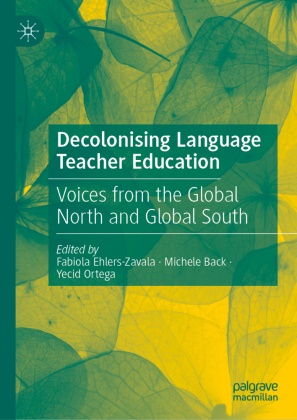Read more
This edited book examines decolonization in applied linguistics, focusing on language teacher preparation across the Global North and South. It brings together diverse voices to challenge colonial legacies and promote more just, inclusive, and locally grounded approaches to education.
Organized into three sections challenges, programs, and strategies the volume first explores systemic barriers that continue to shape language education. It then highlights successful models from varied global contexts, including Southeast Asia, Europe, and the Americas, that reimagine language teacher preparation through critical pedagogy, translanguaging, and community collaboration. The final section offers practical strategies for future action, such as the ethical use of technology to empower marginalized voices in the classroom.
With key themes of decolonization, applied linguistics, language teacher education, social justice, and Global North Global South collaboration, this collection provides essential insights for educators, researchers, and policymakers seeking to reshape language teaching in more equitable and culturally responsive ways.
List of contents
Chapter 1 - Introduction.- Chapter 2 - Anti-colonial micro-moments in language teacher training.- Chapter 3 - Critical language pedagogy principles for Brazilian teacher education programs.- Chapter 4 - The evaluation of a pilot ESOL 16+ course for newcomers in Northern Ireland.- Chapter 5 - Decolonizing Gestures through Community-Engaged Partnerships.- Chapter 6 - LCTL Grassroot Programs as Decolonial Spaces.- Chapter 7 - Decolonial Praxis: Bridging Theory and English Teacher Preparation.- Chapter 8 - Decolonising ELT in Southeast Asia.- Chapter 9 - Borderlands Identities and Translanguaging Stance in Language Teacher Education.- Chapter 10 - Decolonizing Language Instruction: Bilingual Reading to Learn in EFL/EL.
About the author
Fabiola P. Ehlers-Zavala is a Chilean-American first-generation college graduate with over three decades of professional experience in language teacher preparation and the internationalization of higher education. Currently, she is Professor of English (TESOL) at Colorado State University, USA, and is Past President of the American Association for Applied Linguistics (AAAL).
Dr. Michele Back is Associate Professor of World Languages Education at the University of Connecticut’s Neag School of Education, USA. Dr. Back’s research interests include language teacher development of equitable, inclusive, and decolonial practices. Her other books include Racialization and Discourse (Routledge; with Virginia Zavala) and Transcultural Performance (Palgrave).
Yecid Ortega is a researcher with the Artem Research Collective. For over two decades, he has pursued critical, anti-racist, and decolonial approaches to language education. His work explores the cultural and linguistic pluriversality of marginalized communities (immigrants, refugees, 2S/LGBTQI+, neurodivergent, and older adults) through ethnographic, arts-based, and community-oriented methodologies.
Summary
This edited book examines decolonization in applied linguistics, focusing on language teacher preparation across the Global North and South. It brings together diverse voices to challenge colonial legacies and promote more just, inclusive, and locally grounded approaches to education.
Organized into three sections—challenges, programs, and strategies—the volume first explores systemic barriers that continue to shape language education. It then highlights successful models from varied global contexts, including Southeast Asia, Europe, and the Americas, that reimagine language teacher preparation through critical pedagogy, translanguaging, and community collaboration. The final section offers practical strategies for future action, such as the ethical use of technology to empower marginalized voices in the classroom.
With key themes of decolonization, applied linguistics, language teacher education, social justice, and Global North–Global South collaboration, this collection provides essential insights for educators, researchers, and policymakers seeking to reshape language teaching in more equitable and culturally responsive ways.

